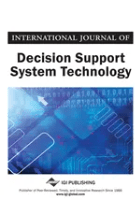
International Journal of Decision Support System Technology
Scope & Guideline
Empowering Decisions Through Innovative Technology.
Introduction
Aims and Scopes
- Multi-Criteria Decision-Making (MCDM):
The journal frequently publishes research on MCDM techniques, exploring various models and frameworks to assist decision-makers in selecting the best alternatives based on multiple conflicting criteria. - Fuzzy Logic and Intuitionistic Fuzzy Measures:
A significant focus is placed on fuzzy logic methodologies and intuitionistic fuzzy measures, which are employed to handle uncertainty and vagueness in decision-making processes. - Collaborative Decision-Making:
Research on collaborative decision-making processes, particularly in emergency and complex scenarios, is prominent, showcasing the importance of involving multiple stakeholders in making informed decisions. - Machine Learning Applications in Decision Support:
The incorporation of machine learning techniques to enhance decision-making capabilities is a notable area of interest, particularly for predictive analytics and optimization in various sectors. - Sustainability and Efficiency in Decision-Making:
The journal emphasizes themes related to sustainability and efficiency in decision-making, particularly in industrial and environmental contexts, reflecting the growing importance of these issues in contemporary research.
Trending and Emerging
- Integration of Machine Learning in Decision Support:
There is a significant uptick in research utilizing machine learning algorithms to enhance decision support systems, particularly for predictive modeling and real-time decision-making applications. - Sustainability and Environmental Decision-Making:
Emerging themes around sustainability, particularly in industrial applications and urban planning, are gaining traction, reflecting a broader societal push towards environmentally responsible decision-making. - Advanced Fuzzy Logic Techniques:
The use of advanced fuzzy logic techniques, including intuitionistic fuzzy measures and hybrid approaches, is increasingly prominent, showcasing a trend towards more nuanced decision-making frameworks. - Healthcare Decision Support Systems:
A growing focus on healthcare-related decision support systems is evident, particularly in the context of pandemic responses and chronic disease management, highlighting the importance of DSS in public health. - Collaboration in Decision-Making Processes:
Research on collaborative decision-making frameworks is on the rise, emphasizing the importance of stakeholder engagement and collective intelligence in complex decision environments.
Declining or Waning
- Traditional Decision Support Systems (DSS) without Advanced Techniques:
Research centered solely on conventional DSS without the integration of advanced methodologies like machine learning or fuzzy logic appears to be decreasing, as the field evolves towards more sophisticated approaches. - General Optimization Techniques:
There is a noticeable decline in publications focusing on generic optimization techniques that do not incorporate specific decision-making frameworks or real-world applications, suggesting a move towards more tailored and context-specific methodologies. - Static Decision-Making Models:
The interest in static decision-making models that do not account for dynamic environments or changing variables is waning, as researchers increasingly recognize the need for adaptive and flexible decision support systems. - Narrowly Focused Case Studies:
The frequency of narrowly focused case studies lacking broader implications or theoretical contributions has diminished, as the journal seeks to promote research with wider applicability and relevance.
Similar Journals

Granular Computing
Connecting Academics and Industry through Granular InsightsGranular Computing, published by SpringerNature, is a premier academic journal dedicated to the interdisciplinary field of granular computing, a vital area of research that intersects with Artificial Intelligence, Computer Science Applications, and Information Systems. With an impressive impact factor indicating its prominence, Granular Computing holds a distinguished Q1 ranking in all three categories as of 2023, making it a critical resource for researchers and practitioners seeking to advance their understanding and applications in these rapidly evolving domains. The journal, based in Switzerland, offers a platform for innovative research, thorough reviews, and discussions that push the boundaries of conventional computing paradigms. Aimed at fostering collaboration and knowledge exchange among academics and industry professionals, it continuously publishes cutting-edge findings and theoretical advancements from 2016 through 2024. Although it operates under a hybrid access model, the significance of its contributions is illuminative for anyone aiming to keep abreast of developments in granular computing and its applications.

EURO Journal on Decision Processes
Illuminating the Science Behind Effective Decision ProcessesThe EURO Journal on Decision Processes, published by ELSEVIER, is a premier open-access journal dedicated to the multidisciplinary field of decision-making processes in various contexts, including applied mathematics, business, and management. Since its inception, the journal has leveraged its platform to foster innovative research and discussions among scholars and practitioners. With a commendable impact reflected in its 2023 Scopus rankings and Category Quartiles, specifically Q2 in Applied Mathematics and Business, Management and Accounting, the journal stands as a vital resource for advancing the understanding of decision-making methodologies and frameworks. Notably, the journal has embraced open access since 2021, increasing visibility and accessibility for researchers and students alike. The scope encompasses a wide array of topics, reflecting the complexities of decision science in today's dynamic environments, making it an essential publication for those seeking to contribute to and engage with the frontier of decision processes research.

Decision
Fostering Innovation in Decision-Making ResearchDecision is a prestigious journal published by Springer, focusing on the multifaceted field of decision-making processes across various domains such as psychology, economics, management, and social sciences. With the ISSN 0304-0941 and E-ISSN 2197-1722, this journal serves as a critical platform for the dissemination of high-quality research articles, providing insights into theoretical frameworks and empirical studies that shape our understanding of decision-making. Although currently not open access, articles may be available through institutional subscriptions, ensuring that a wide audience can engage with the latest findings in the field. The journal's commitment to enhancing scholarly communication and its rigorous peer-review process underscore its importance in fostering a deeper understanding of the complexities within decision sciences. Researchers, professionals, and students are encouraged to contribute and stay informed through this essential resource located at One New York Plaza, Suite 4600, New York, NY 10004, United States.
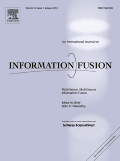
Information Fusion
Exploring Cutting-Edge Methodologies in Signal Processing.Information Fusion is a premier journal published by Elsevier, specializing in cutting-edge research within the fields of hardware and architecture, information systems, signal processing, and software. With a significant impact factor, it remains at the forefront of academic discourse, boasting a remarkable Q1 ranking in each of its categories in 2023, which underscores its critical role in advancing knowledge and innovation in these domains. The journal, with ISSN: 1566-2535 and E-ISSN: 1872-6305, is dedicated to fostering collaboration and the dissemination of research findings that drive technological advancements and improve system efficiencies. Researchers, professionals, and students alike will find a wealth of valuable insights into emerging methodologies, trends, and applications. Designed to bridge the gap between theory and practice, Information Fusion invites contributions that enrich the academic landscape and provoke engaged discussions among the scholarly community.

JOURNAL OF MULTIPLE-VALUED LOGIC AND SOFT COMPUTING
Catalyzing Breakthroughs in Logic Systems.Journal of Multiple-Valued Logic and Soft Computing, published by Old City Publishing Inc, is a dedicated forum for advancing the fields of logic and soft computing. Since its inception in 2003, this journal has positioned itself as a valuable resource for researchers, professionals, and students interested in the complex interplay between multiple-valued logic systems and computational methodologies. With a broader reach into theoretical computer science, the journal is categorized in the Q4 quartiles across key areas, showcasing its role in disseminating relevant research despite its current position. This peer-reviewed publication silos essential discussions and breakthroughs that serve as a foundation for ongoing innovation in logic and computing theories. Though not currently open access, the journal continues to attract critical contributions that underscore its commitment to advancing knowledge in mathematical logic and software development through its effective symposium-like format, promoting collaboration among various stakeholders in the scientific community.
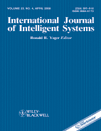
INTERNATIONAL JOURNAL OF INTELLIGENT SYSTEMS
Fostering Interdisciplinary Dialogues in Intelligent TechnologiesInternational Journal of Intelligent Systems, published by Wiley-Hindawi, stands at the forefront of the Artificial Intelligence, Human-Computer Interaction, Software, and Theoretical Computer Science fields. With an impressive Q1 ranking across multiple categories in 2023 and a robust track record since its inception in 1986, this journal is essential for researchers, professionals, and students alike who are eager to explore cutting-edge innovations and theoretical advancements. Located in the United Kingdom, the journal operates under the esteemed Wiley-Hindawi publishing house, ensuring a broad dissemination of high-quality research articles. The journal's diverse scope encompasses advancements in intelligent systems and their practical applications, fostering an interdisciplinary dialogue that encourages collaboration across various domains. Although Open Access options are not available, subscribers benefit from the rich repository of knowledge this journal offers, making it a vital resource in the rapidly evolving landscape of intelligent technologies.
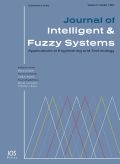
JOURNAL OF INTELLIGENT & FUZZY SYSTEMS
Elevating Knowledge in AI and Engineering DisciplinesJOURNAL OF INTELLIGENT & FUZZY SYSTEMS is a premier publication dedicated to advancing the field of artificial intelligence, fuzzy systems, and related engineering disciplines. Published by IOS PRESS, this journal plays a vital role in disseminating innovative research and methodologies that push the boundaries of knowledge from its inception in 1993 through 2024. With an impact factor underscoring its significance, it maintains a strong reputation for quality and rigor, achieving Q3 in Artificial Intelligence and Q2 in Engineering (miscellaneous) as reported in 2023. Researchers can access invaluable insights into current trends and applications, making it an essential resource for professionals and scholars alike. The journal welcomes contributions that bridge theoretical advancements and practical implementations, fostering a community of interdisciplinary collaboration. Situated in the heart of the Netherlands, the JOURNAL OF INTELLIGENT & FUZZY SYSTEMS is committed to enhancing understanding in the realms of mathematics, statistics, and probability, with Scopus rankings reflecting its competitive edge across various fields.

Journal of Advanced Computational Intelligence and Intelligent Informatics
Exploring the Future of Intelligent SystemsThe Journal of Advanced Computational Intelligence and Intelligent Informatics, published by FUJI TECHNOLOGY PRESS LTD, stands as a pivotal platform in the fields of Artificial Intelligence, Computer Vision, and Human-Computer Interaction. Established in 1997, this Open Access journal has been providing accessible insights into the latest advancements in computational intelligence and informatics since 2007. With its ISSN 1343-0130 and E-ISSN 1883-8014, this journal invites a diverse readership, including researchers, professionals, and students eager to explore innovative methodologies and applications. Despite its current Q4 ranking in the relevant categories, the journal remains committed to contributing valuable knowledge to the academic community and enhancing the global discourse in computational technologies. With its focus on fostering communication and collaboration among scholars, the journal plays an essential role in driving forward the understanding of intelligent systems and their applications in various domains.
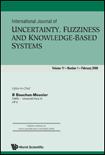
INTERNATIONAL JOURNAL OF UNCERTAINTY FUZZINESS AND KNOWLEDGE-BASED SYSTEMS
Empowering research through the lens of uncertainty and fuzziness.Welcome to the INTERNATIONAL JOURNAL OF UNCERTAINTY FUZZINESS AND KNOWLEDGE-BASED SYSTEMS, a prestigious publication dedicated to advancing the fields of artificial intelligence, control systems engineering, information systems, and software research. Published by WORLD SCIENTIFIC PUBL CO PTE LTD in Singapore, this journal serves as a vital forum for the dissemination of innovative theories, methodologies, and applications rooted in the coexistence of uncertainty and fuzziness within knowledge-based systems. With its ISSN 0218-4885 and E-ISSN 1793-6411, the journal consistently ranks in the Q3 category across various Scopus categories, including Control and Systems Engineering and Information Systems, reflecting its influential position in the academic community. Researchers and practitioners alike will find valuable insights and the latest trends through its comprehensive articles, making this journal an essential resource for those seeking to navigate the complexities of this evolving field.
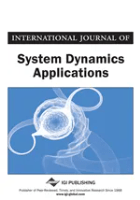
International Journal of System Dynamics Applications
Advancing the Frontiers of System Dynamics Research.The International Journal of System Dynamics Applications (ISSN: 2160-9772; E-ISSN: 2160-9799), published by IGI Global, serves as a premier platform for scholars, professionals, and students in the field of system dynamics. This journal aims to promote the advancement of theory and practice in system dynamics, providing critical insights and innovative methodologies that address complex real-world systems across various disciplines, including engineering, economics, and social sciences. Although not an open-access journal, it ensures a rigorous peer-review process, maintaining high standards of scientific integrity and quality in every published paper. With its commitment to disseminating cutting-edge research and practical applications in system dynamics, this journal plays a vital role in shaping contemporary discourse and fostering collaborative efforts within this essential field. The address for correspondence is 701 E Chocolate Ave, Ste 200, Hershey, PA 17033-1240.